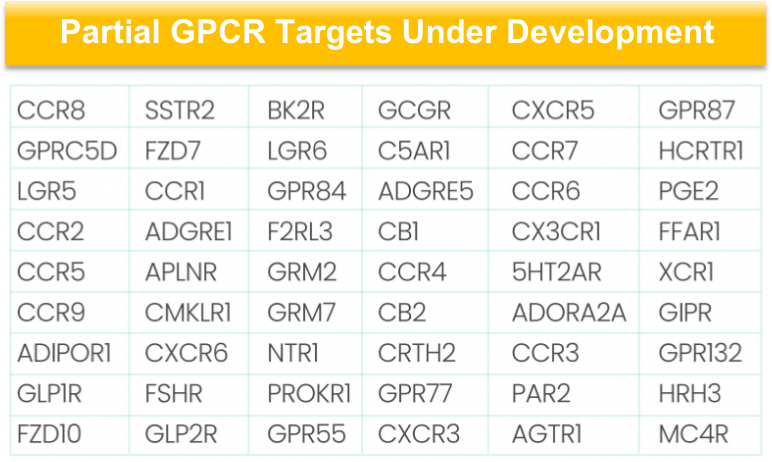GPCR (G protein-coupled receptor) is the most abundant membrane protein in the human genome. Its primary function is to transmit extracellular information into the cell, causing various cellular responses. Approximately one-third of the drugs on the market target the GPCR protein by activating or blocking the GPCR signal pathway to achieve therapeutic effects. Compared with small molecule drugs, GPCR antibody drugs can not only activate or block the signal pathway but also directly eliminate diseased cells through the ADCC or ADCP effect of antibodies in a targeted manner.
Previously, slow progress was made due to the difficulty in antigen preparation and the lack of high-throughput screening methods for GPCR antibody discovery. However, with the rapid development of antibody development technology, Biocytogen has established a perfect GPCR antibody discovery platform, enabling efficient GPCR antibody discovery and development.
Advantages of Biocytogen’s GPCR platform
1. Antigens with native conformation: Biocytogen's GPCR antibody discovery platform uses antigens with intact native conformation for immunization of RenMice mice. This ensures that the fully human antibodies obtained have high specificity and diversity, and allows for a scientific and comprehensive evaluation of the druggability of targets. The GPCR antigens are provided to the mice through DNA immunization and cellular immunization.
2. In vivo DNA transfection technology: To improve the efficiency of DNA immunization, Biocytogen employs in vivo DNA transfection technology, using suitable transfection adjuvants and optimizing plasmid elements based on extensive experimental data. This results in higher expression levels of GPCR antigens in the mice, which in turn leads to better antibody responses.
3. Immunopotentiating peptide: Biocytogen's GPCR platform uses a short peptide fragment fused to the intracellular C-terminal domain of GPCR that effectively binds to mouse MHC class II molecules, which enhances the immune response in mice by activating CD4+ T cells. This approach enables the development of high-affinity antibodies with diverse epitopes and physiological functions.
4. Knockout mice and humanized mice: Biocytogen employs target gene-knocked out RenMice for antibody discovery. These knockout mice produce antibodies that can recognize the homologous antigen sequences between mice and human, making the minimal extracellular domains of GPCR targets as recognizable epitopes. This not only improves the diversity of epitopes recognized by antibodies but also leads to more antibodies that can cross-recognize humans and mice, facilitating efficacy validation in mice. However, some GPCR targets have low homology between humans and mice, making it challenging to obtain cross-reactive antibodies. For these targets, Biocytogen has bred target gene-humanized mice or mice humanized for both the ligand and receptor to provide suitable experimental animal models. This approach helps to generate antibodies that can recognize the GPCR targets and enables the validation of efficacy and safety in animal models that more closely resemble human biology.
GPCR Antibodies Under Development

Related News










